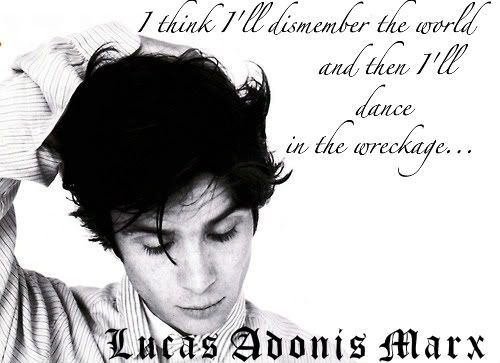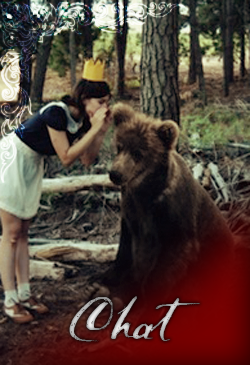Post by LUCAS MARX on Jan 30, 2012 23:54:36 GMT -5
...Lucas Adonis Marx*
* I think I’ll dismember the world and then I’ll dance in the wreckage. *
[/size]* I think I’ll dismember the world and then I’ll dance in the wreckage. *


...basics*
name
Lucas Adonis Marx
nickname
Officer Marx
age
Twenty-six
gender
Male
grade
N/A
hometown
Detroit, Michigan
sexuality
Technically speaking, straight. But whatever will get him where he needs to go, really.
personification
Rumpelstiltskin
status
Awake
face claim
Cillian Murphy
...appearance*
hair color
Dark chocolate brown, the length of which varies from clipped short to somewhere just above his brows.
eye color
A bright, captivating blue. They’re quite striking, he’s been told.
build
Quite fit, although he makes a point not to show off bulky arms (not that they are) or brag. It’s best when one still possess the element of surprise.
height
Five feet, eight and a half inches
clothing style
When not in his NYPD uniform, Lucas can be found in a wide array of clothing, depending on where it is he’s going. Sort of a general description, yes, but he really doesn’t have much of a specific style. He’s well-dressed, all things considered. But then, it’d be rather unfortunate to be twenty-six and still know nothing of how to tie a tie or pull off a button-down.
distinctive traits
Those eyes. Those freaky ice blue eyes and ever-so-prominent cheekbones. Oh, and the odd way he smirks, as though somehow you owe him something simply because he’s graced the world with his presence. It’s a look that’s gotten him into a bit of trouble, to be honest.
...personal*
personality
All his life, Lucas has craved one thing and one thing only: power. He aches for it like a killer does blood, craves it like a starving man does food, and yearns for it with the sort of undying passion that drives lovers mad. It’s the sort of longing that, although for lack of a better term is all-consuming, one wouldn’t particularly see on the outside, were they to just take a good look at the man. He’s rather cold, yes, abhors being belittled, and there’s something just ever so slightly off about those eerily blue eyes, but to look at Lucas isn’t to see that he’d like more than anything to make your head into a stepping stool. You see, his philosophy is and always has been a simple one: control for control’s sake is not half as important as control over the right people in the right places. For all intents and purposes, he appears a relatively average man proud of his job, albeit not outrageously devoted.
With an inner philosophy like that, you’d think he’d be a brilliant chess player. Unfortunately, he’s not. Brilliant though he is in maintaining a charismatic façade complete with stereotypical donut-eating, Lucas is completely and utterly lacking in the department of strategic planning. Left to his own devices with the same intentions, he’d do nothing more than flounder. As it is, the aid of a certain devilish little man residing inside his head has helped him get moderately far in terms of illicit assets, but there too have been consequences. Rumpelstiltskin does nothing close to control him—he acts as a sort of antichrist, whispering fiendish words in Lucas’s ear whenever he sees fit, knowing full well the little puppet will lead him to exactly where he wants to be soon enough, even if there are a few detours. Both are patient men. Still, Lucas undeniably spreads himself too thin. Corrupt and eager to make his mark in the world, he’s never been much good at picking and choosing who to go to for help, and has consequently made himself just as many enemies in New York’s underground society as friends. The only good thing about this situation is perhaps his immense paranoia about handing out anything personal. Information is power in itself—that much he’s known from the age of twelve—and with the right kind and amount, one can bleed anyone dry.
The same idea works in reverse, however, and goes along with Lucas’s mantra. He doesn’t give things out to anyone—facts, preferences, snide trivia answers, and least of all his name. Perhaps it’s a bit paranoid, but it’s a habit he’s had since he was a boy. Originally, it started off as using whatever name popped into his head when some overly-nosy adult would ask him how he’d split his lip, cut his knuckle or bruised his eye. Over the years, however, it’s grown simply into the fact that he doesn’t give out his first name, preferring instead to go merely by his last. It’s not difficult, as he’s a police officer and that’s all most people care about anyway, when he’s in uniform. Really, it’s his time off duty that he worries about. “Marx” isn’t exactly a common name, first or last, but still required for the sake of credibility. There are others mixed into the NYPD of course, but there is very much always a part of him afraid that all this double crossing will get back to him one day and he’ll literally have nowhere to go and no one to protect him. Occasionally, he receives slight panic attacks involving this scenario and all its subsequent possibilities, but Rumpelstiltskin usually calms them with visions of grandeur and the next small step in his overly-intricate plan.
In truth, Lucas is at heart nothing more than a coward. A little boy who still thinks the safest place to be is his bedroom with the dresser propped against the door and a pillow clamped over his ears, except now the dresser is the people he’s made deals with, and the pillow is the story man’s supposed words of wisdom. It’s been nine years since he last saw his father, but the mindset isn’t one he’s entirely grown out of. It was that man, after all, who seemed so brilliantly kind and gentle by day, who’d taught him just what it meant keep up appearances in the eyes of the public. No one would take the word of his lying, trouble making son over that of his own—he was a successful businessman who enjoyed the occasional drink. Maybe occasionally it got a bit out of hand. Didn’t everyone, when they were celebrating? He’d never raise a hand on his wife, let alone his son. It was with this unknowingly-brilliant man as a guide that Lucas learned people are far more likely to swallow lies when surrounded in thick, padded coatings of perfect truths. Consequently, he’s been trying to perfect the technique for years now, keeping a constant cloak of inconsequentiality as his most prized (and most effortlessly obtained, as he is truly nothing more than average) possession when he fears discovery. It’s constant, the knowledge that at any moment in time he could be discovered and the whole jig will be up because he’ll be deemed no longer an asset to those he risked his job for, and he’ll be left alone, without protection. As much as he wants power, protection is what Lucas needs. It always has been. Without it, he’ll starve. He doesn’t know what to do with himself without instruction in one form or another, and lacks the initiative to reach his goals if not given step-by-step instructions on how to get there.
past
Growing up in Detroit was never a treat. Widely known as one of the least desirable cities to live in the whole of the United States, Lucas Marx spent his childhood smack in the center of it. His family was not well-off, but neither were they poor. Whether that was a good or bad thing, he’s never bothered to consider (honestly, he tries not to consider them at all).
The family of three lived in a two bedroom, one-and-a-half bath condo, and for the most part, were outwardly happy. Jonathan and Susan had met at a bar when she was fresh out of college, he just establishing his career. They’d dated for two years, married, stayed childless for a few years, led outwardly normal lives, save the few bruises Susan occasionally showed up to work with—they were the kind no one spoke anything of. Sometimes, Jonathan seemed to smell of something a bit more poignant than cologne—something bordering on the spirit side of things—but that too was always brushed aside by their friends and acquaintances. They were always so happy together, after all. Nothing could possibly be wrong.
People don’t see things they don’t want to.
When Lucas was born, people saw happiness. They saw tapes of a proud father holding his blue-eyed son and a beaming mother in a hospital gown, sweaty and smiling like she’d just birthed the world’s first and finest baby. As he grew, they saw a toddler who smiled, laughed, and played like all children should, and who looked at his father like he was God. So, maybe Lucas’s first word was “fuck.” It was a joke, among the family’s friends. Maybe he was exceedingly fond of pulling girl’s hair and punching boy’s faces all throughout preschool. He was a bit of an…odd child, perhaps, with his big, enigmatic blue eyes that always seemed to be staring straight through people and that funny, rude habit of swearing far more often than any kindergartener should know how.
Of course, to him, it all made sense. Being a young child, Lucas very much thought it was normal, the bruises his mother so vainly tried to cover at the breakfast table, and the crying that he sometimes heard coming from his parents room late at night, not to mention the Jack Daniel’s that never seemed to be too far from his father’s left (and non-throwing) hand.
As he grew older, however, Lucas came to notice that none of his friends’ mothers got black eyes as often as his did—if they got them at all. None of their fathers drank whiskey at the dinner table, either.
He didn’t want to see it, but he did anyway, because sometimes the truth burns.
He was eleven when he first stood up to him. Eleven when he barged into his parents’ bedroom at eleven o’clock at night and yelled “STOP IT!” at the top of his lungs, standing in front of his mother with narrowed eyes and tiny, trembling fists. He was eleven when he received his own first black eye, delivered with a wicked, booze-stained smile. After that, the punches didn’t really stop. At first it was a monthly thing, then weekly, then nightly, and soon his mother hardly got hit at all. Sometimes he took them with winces, but usually there were tears, which only increased the ferocity of the things. Every once in a while, he wondered whether they’d have happened at all, had he kept quiet at the age of eleven. His mother didn’t stand up for him, though she was not a weak woman all together; more accurate would be that she had simply been broken, and could not fathom what it would be like not to watch someone hurt, even if it wasn’t herself. Lucas never blamed her, although he often felt betrayed.
Lucas was never a strong boy, either physically or emotionally. He grew up small, scrawny and quiet, always the follower, although there could be no denying his excellence at obeying. When his father told him to “Quit acting like a fucking pussy and take it like a man,” he did, albeit with a trembling lip. Over time, Lucas grew to see what he thought was the importance of the man’s so called “lessons,” and found the root of them to be very simple: Power. His father had it in bucket loads, and so he was obeyed. It was a simple, logical progression of thought which brought him to determine this: power meant people feared you, and fear meant people listened. When people listened, the one with the power got what they wanted without any consequences but another glass of whisky and a nice, front-and-center view of the damage they’d done.
It all sounded wonderful. To be feared, respected, and revered became all Lucas ever wanted. Consequently, he sought out to obtain such respect in the simplest way he thought possible, for he had always been one for simple things—trouble. Although never convicted with a federal crime, Lucas participated in his fair number of fights and various other moderately petty violations of the law. No doubt the clean criminal record he came out of the phase with was due to the fact that he almost always lost, and ended up playing the part of the victim. It’s much easier to whimper, after all.
During his late teenage years, Lucas steadily grew out of his trouble-making phase and into one of justice. Perhaps a bit of an odd switch, but he thought nothing of it. At home, he still took his father’s word as law, didn’t cry and never yelped, but also never stood up for himself, either, as he’d long ago learned the consequences of doing so, never mind that he could probably have taken his father in a fight with relative ease (saying something, for him). Instead, he focused on dealing out judgment to others, surrounding himself with law books and pamphlets he had neither the mind or true ambition to attempt to comprehend. So, he turned to the next best thing: becoming a cop.
present
When Lucas graduated high school, he literally packed up and left for New York the next day, desiring to move to that city and that city alone for one reason: it was powerful. People feared it. That was why it’d been attacked in 2001 and that was why people continued to flock there from all walks of life, trying to scratch their way to the surface of the grime that coated the city’s streets. He left with hardly a good-bye, for his relationship with his parents had quite obviously diminished long ago.
At first, it was frightening, as most things to Lucas were and are. Soon, however, he found himself a badge to wear and a whistle to blow and a gun to fire and for a while, he was quite content. Then something happened. About two weeks after his official induction into the NYPD, he began to hear voices—or more accurately, a voice—in the back of his head. It would whisper things about not being nearly good enough, and about how he could be great, if only he decided to take a few chances. Naturally, Lucas brushed this odd advice off, refusing to call himself crazy. But they only grew louder and more persistent, until eventually, they grew to the point where he couldn’t help but talk back.
“I’m not crazy. I’m not crazy. I’m just…stressed. Not crazy.”
“No?” the voice would taunt, and Lucas couldn’t help but think sometimes that maybe, it was right. It—no, he. It was definitely a he—spoke so coolly, and with the sort of confidence that gave Lucas chills.
The man taunted him for months, weaving in and out of his conscious and unconscious mind with words, promises and ideas or glory and greatness that were far closer than Lucas’s tiny little brain could ever hope of conceiving. It all sounded so wonderful, Lucas immediately agreed to help the nameless parasite inside him, figuring the whole thing was probably just some extension of his previously repressed over-active imagination or something (only, in smaller words) anyway. After all, what could go wrong?
First, it was gathering information. “Leverage,” the ever-evasive little man called it.
Then, contacting. “Seeking out assets.”
Third, meeting. “Just listen to what I say, and you’ll keep your spineless ass intact. I promise, I’m here to help.”
Next, proposing. “Make them want you. Do what I say, and I promise, they will.”
Finally, insuring their full attention. “Just when they start to realize you’re only some dumbfuck cop, show them how smart you are. Wile ‘em. Rile ‘em up. That’s it. See the fear in their eyes? You did it. Have yourself a drink, you beautiful, worthless bastard—you’re gonna have enough money for rounds more, you keep this up.”
And keep it up he did. The more bribes Lucas accepted, the more about himself the little man would give away, and the happier Lucas grew to be. When the little man told him his name, he whispered, even though it was all happening in his host’s head, for he said he had “Debts to pay, and people who won’t like you much if they find out where I am. Kapish?”
Now, Lucas treats Rumpelstiltskin’s word like the gold the man claims to be after, calling him simply “Sir,” even in his own mind, for both simplicity (it’s a hell of a name) and protection’s sake. As for the latter, he’s also given up on handing out his own name on whims, only using the genuine one when in uniform, and otherwise going by whatever the hell strikes his fancy at the moment. The more plain, the better. He likes not blending in, at the moment. It’s better that way, with what he does. He’ll be recognized eventually and he knows it, for Sir said so, and he’s never been wrong before.
family
Jonathan Karl Marx, 63, owner of a construction firm
Susan Elizabeth Marx, 54, housewife
likes
1) Power. He craves it, and will certainly step on heads to get there, when the time comes to obtain it. It just hasn’t yet, is all.
2) Debts repaid, even if not always in the way the debtor imagined. However, this really only applies when he’s collecting, which isn’t often.
3) Protection.
4) His ambiguity. It’s only because he’s nobody, after all, that he can do so much.
5) Revolutionaries, and the idea that it’s usually the most insignificant people who come out on top in the end. He enjoys reading books about them.
6) Books on serial killers. He likes to read, really. Currently, he’s a fan of John Wayne Gacy and the infamous Jack the Ripper.
7) The feeling of a gun in his hand. He still remembers the first time he held one, and the sound it made when he pulled the trigger. Unfortunately, he also recalls just as vividly how much his stomach lurched afterwards.
8) Green apples
9) The undeniable thrill of toeing the line literally right under the law’s nose.
10) Rumpelstiltskin. He’d be dead without him. And hopefully, he’ll get to somewhere fantastic with him.
11) This is more of a “would like” than anything, but he’d quite like a kid. You know, something that sort of…likes him from the get go. Or respects him. One of the two. How exactly he’s going to come across one, he has no idea, but that’s just another one of those things Sir’s promised him, should he do what he says.
dislikes
1) Cowardice at all points in time, although particularly when in himself.
2) Bartering, because somehow it always manages to come back and nip him where it hurts most.
3) Alleyways. There aren’t enough ways out.
4) Giving out personal information. People should never know too much, and too little is always just enough.
5) Just how dependent he is on his more illicit activities, because he knows full well what sort of shit he’d be in where he ever to get caught.
6) The fact that others know how much shit he’d be in. Again with the ambiguity issue.
7) Being threatened. It doesn’t sit well with his stomach. Or his temper.
8) Having a fairly recognizable face. There have been problems with that before.
9) The semi-constant feeling of paranoia.
10) Rumpelstiltskin. Without him, he’d never be in this mess in the first place. He’s very much aware that the little man is probably far more trouble than he’s worth. It’s not like he can do anything about it. Even if he could, he wouldn’t.
other notes TEXT HERE
...literature*
book title
Rumpelstiltskin
backstory
Basically, Rumpelstiltskin is this creepy freak of a man who offers to help a miller’s daughter who’s told to spin straw into gold and can’t, obviously, because that’s not how science works and: PLOT DEVICE. So the little man spins the straw for her in exchange for her necklace, and then the next night for her ring. On the third night, he asked for the girl’s first born child, and she agreed because: PLOT DEVICE. And she’s a heartless, soulless idiotic wench. So anyway, she ends up marrying the king (who told her to spin the straw in the first place) and they have a kid, and good ol’ Rumpy comes back and nabs it. But, because of PLOT DEVICE, he tells the girl/queen that she can have her kid back if she guesses his name. And, finally deciding to take some initiative, queenie goes out looking for the creepy little man who took her kid (THAT SHE OFFERED UP IN THE FIRST PLACE. NOW SHE LOVES HIM, BECAUSE HE’S ALIVE AND SHE’S A QUEEN) and finds him dancing around a fire like a crazy person, singing his name. So she goes back to the castle and when he comes to see if she guessed, she plays real coy to create suspense but then BAM! SHE GUESSES HIS NAME. And Rumpelstiltskin throws a temper tantrum that literally results in him snapping himself in half. Because that happens often, actually.
El fin.
...roleplayer*
name
Scout (Becket don’t kill me)
age TEXT HERE
gender TEXT HERE
rp experience TEXT HERE
how you found ouac TEXT HERE
rp sample AT LEAST THREE PARAGRAPHS













